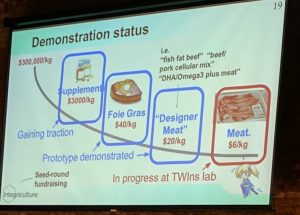Jesse Ausubel participated in “Looking Back as We Move Forward,” a conference in honor of historian of science Jed Z. Buchwald, at the California Institute of Technology 26-27 April 2019, and contributed a paper on “Microphysics and Macrohistory” to the proceedings. Buchwald is an expert on Maxwell and microphysics.
Area of Research: Technology & Human Environment
Nordhaus Nobel recollection
In December 2018 Jesse Ausubel had the privilege and fun of inclusion in the delegation to Stockholm of William Nordhaus for his receipt of a Nobel prize. The occasion stimulated Jesse’s recollection, “Getting to know Bill Nordhaus and Climate: On the occasion of his receipt of the Nobel Memorial Prize in Economics for the study of the economics of climate change.“
Cars and Civilization auf Deutsch
The essay Cars and Civilization by Jesse Ausubel has been translated into German by Thilo Spahl and appears (with fewer illustrations) in Thilo’s 2018 book Around the World in 80 Minutes (In 80 Minuten um Die Welt) as “Die Geschwindigkeit zaehlt” (Speed pays), pp. 30-49.
Worthless Nature
Thanks to Marian Tupy for republishing Jesse Ausubel’s short essay, We Must Make Nature Worthless, in Human Progress.
Peak stuff?
Fred Pearce writes about our exploration of whether humanity is nearing peak use of stuff in this article in Anthropocene magazine: Are We Approaching Peak Stuff? Almost imperceptibly, we are stepping off the consumption treadmill
Polished version of Michelson Oceans lecture
Jesse Ausubel had the honor in October 2015 to present the Michelson Lecture at the United States Naval Academy in Annapolis. Thanks Captain and Professor Emil Petruncio!
We now post a polished version of that lecture, “Ocean Past, Ocean Future: Reflections on the Shift from the 19th to 21st Century Ocean.”
Abstract In the 19th century humans knew little about the oceans, but other forms of life knew a lot. Our job the past 135 years has been to catch up and surpass other forms of life in knowledge of the oceans. The advance of observation through science and technology, including new carriers and processors of information, has vastly expanded the oceans knowable to humans beyond what a sailor’s five senses could directly provide. By infiltrating the ocean with informationally connected sensors, humans are becoming the top experts on the oceans in the 21st century.
New Harvest conference
Loglet Lab software version 4
The behavior of a dynamic system, be it biological or socio-technical, frequently resembles a series of logistic wavelets, or “loglets.” Loglet analysis involves the decomposition of growth and diffusion patterns into S-shaped logistic components. In the easiest cases, a loglet appears as a single S-shaped curve. LogletLab is designed for use with user data to help users analyze and decompose growth processes.
LogletLab software has gone through several development cycles since the initial release of LogletLab 1 in 1998 straight through to the recent release of LogletLab 4.1, an online tool with extensive statistical analysis capabilities built in. The most recent edition of LogletLab 4.1 offer users numerous new features including an extended selection of fitting functions and advanced statistical analysis.
All versions of LogletLab are available free of charge.
Click here to access LogletLab 4
Here is an example, the space shuttle launch history.
https://ll4.ddns.net:8000/?page=index&preload=library.get.288
Thanks to David Burg, Eyal Schachter, Perrin Meyer, Jason Yung, Iddo Wernick, and Alan Curry.
Maglevs in the NY Times
An article about the Hyperloop magnetically levitated train in the 10 August 2017 New York Times quotes Jesse Ausubel:
Why Even the Hyperloop Probably Wouldn’t Change Your Commute Time
Humans have historically tended to travel about half an hour to work, regardless of how fast the mode of transportation.
——————————–
We first studied maglevs during the 1980s as part of a National Academy of Engineering project on cities and infratructures. Not enough has changed.
R Herman, JH Ausubel. Cities and their vital systems: Synthesis and perspectives Pp 1-21 in Cities and their vital systems: Infrastructure, Past, Present, and Future, National Academy, Washington, DC1988
More recent essays in this domain are:
————————————
Italy’s Corriere della Sera also runs a new story :Ecco perché auto senza pilota e treni iperveloci non ci faranno … Corriere della Sera–Aug 15, 2017
Concrete Life Cycle Assessment
PHE researcher Iddo Wernick co-authored a recent article, Comparative LCA of concrete with natural and recycled coarse aggregate in the New York City area, published in The International Journal of Life Cycle Assessment. Congratulations to the main co-authors, professors Ardavan Yazdanbakhsh and Larry Bank and student Thomas Baez, in the Department of Civil Engineering at City College of New York.
